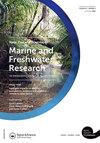绿唇贻贝、小管贝的免疫学研究进展:驱动因素、毒力因素、进展及应用
IF 1.7
4区 环境科学与生态学
Q3 FISHERIES
New Zealand Journal of Marine and Freshwater Research
Pub Date : 2023-10-25
DOI:10.1080/00288330.2023.2269865
引用次数: 0
摘要
特有的绿唇贻贝(Perna canaliculus),商标为Greenshell™贻贝,以吨和出口价值为基础,对新西兰水产养殖业贡献最大。贻贝免疫的研究在很大程度上是出于经济和生物安全的需要。事实上,贻贝养殖受到病原微生物和环境压力的威胁。因此,有必要了解驱动贻贝免疫反应的机制以及与环境的相关相互作用。具体而言,本综述(1)分析了目前对小管贝的免疫学研究,(2)从细胞和体液水平对有关贻贝免疫的文献进行了评价,(3)鉴定和讨论了与小管贝相关的病原体,(4)重点介绍了可能诱发疾病的贻贝病原体的毒力因素,(5)全面分析了贻贝对各种应激源的反应机制。(6)探讨组学在贻贝免疫学中的应用及未来展望。最后,本文综述了各种免疫学研究策略,如基因重排、益生菌、免疫刺激剂和选择性育种,有望提高贻贝的健康和适应能力。本文通过对这些免疫学发现及其实际应用的探讨,为贻贝的可持续养殖、提高贻贝的生产效率和病害管理做出贡献。本文章由计算机程序翻译,如有差异,请以英文原文为准。
A review on green-lipped mussel, Perna canaliculus immunology: the drivers, virulence factors, advances, and applications
The endemic, green-lipped mussel (Perna canaliculus), trademarked as Greenshell™ mussel, contributes most to the New Zealand aquaculture industry based on tonnage and export value. Research on mussel immunity is motivated greatly by economical and biosecurity necessities. Indeed, mussel aquaculture is threatened by pathogenic micro-organisms and environmental stressors. As such there is a need to understand the mechanisms that drive mussel immune responses and the associated interactions with the environment. Specifically, this review (1) analyses the existing immunological studies conducted on P. canaliculus, (2) evaluates the literature pertaining to mussel immunity at the cellular and humoral levels, (3) identifies and discusses pathogens that are relevant to P. canaliculus, (4) focuses on the virulent factors employed by mussel pathogens likely to induce diseases, (5) provides a comprehensive analysis of the response mechanisms employed by mussels to various stressors, and (6) explores omics applications and future perspectives in mussel immunology. Finally, this review highlights various strategies from immunological research, such as gene rearrangement, probiotics, immunostimulants, and selective breeding, promising to enhance mussel health and resilience in aquaculture. By exploring these immunological findings and their practical applications, this review contributes to sustainable mussel aquaculture, improving productivity and disease management in the industry.
求助全文
通过发布文献求助,成功后即可免费获取论文全文。
去求助
来源期刊
CiteScore
4.50
自引率
12.50%
发文量
35
审稿时长
3 months
期刊介绍:
Aims: The diversity of aquatic environments in the southern continents and oceans is of worldwide interest to researchers and resource managers in research institutions, museums, and other centres. The New Zealand Journal of Marine and Freshwater Research plays an important role in disseminating information on observational, experimental, theoretical and numerical research on the marine, estuarine and freshwater environments of the region.

 求助内容:
求助内容: 应助结果提醒方式:
应助结果提醒方式:


